Why Study in Australia?
Deciding on study destinations these days does not depend on the quality of education alone, but it is a matter of choosing a great place to live, have fun, and grow a career. For international students, Australia can be the one place where you can have it all.
Australia is also known as a “Lucky Country” because travelers, professionals, and students can experience things they will not find elsewhere. It is said that Australia is a lucky country because the country shares its luck with the people who live there.
This place is vibrant with culture and opportunities. You can enjoy the natural beauty of the Aussie mainland, feel the vibes of big cities and get a taste of fantastic foods and wines. In short, it is the ultimate answer to the question, why study in Australia?
Check out our Study in Canada guidelines if you are interested to know more about study abroad opportunities.
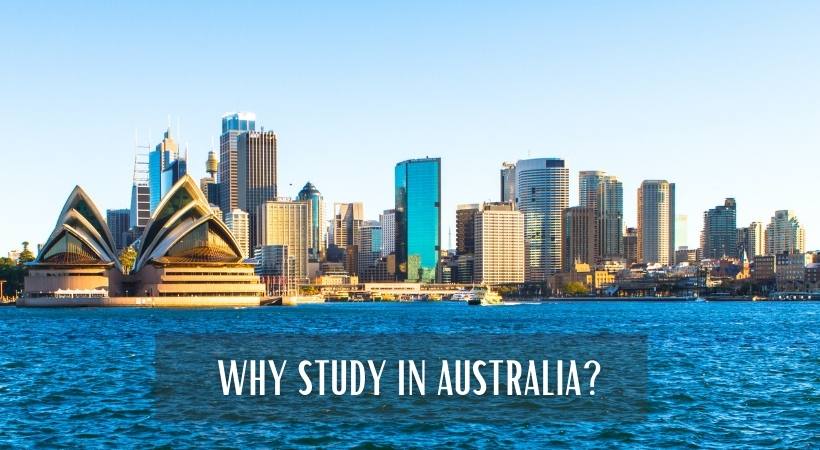
In 2017, Australia enrolled 624,000 international students in different education sectors, of which 400,000 students are here for Higher Education only. In 2019, the number rose to 754,656 international students. .
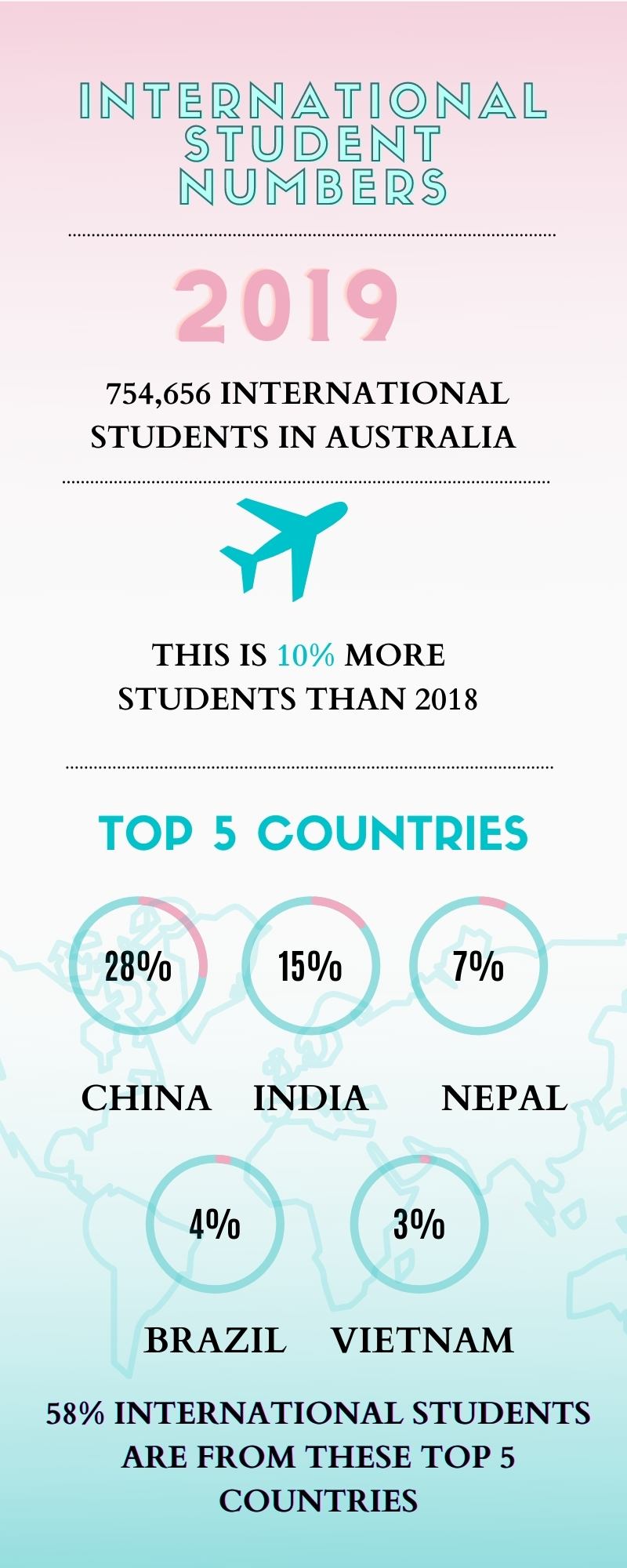
TOP 8 REASONS FOR WHY TO STUDY IN AUSTRALIA
1. World-class Education
Australia has leading institutions and groundbreaking innovations, which is the most important reason to study in Australia. The quality of education in Australia is top-notch because they encourage their students to think big.
Most Australian Universities are constantly featured in Global Rankings of the top 100 universities globally. Australia sets the education standard for excellence internationally because of its world-leading education providers, premium facilities, and outstanding faculty members.
The government accreditation ensures strict quality control specifically designed for international students to provide them outstanding University experience. It means there is legislation in place that ensures all the education providers maintain specific standards, keeping in mind the students studying under a student visa. The legislation also ensures the rights of international students.
A degree from an Australia University is globally recognized, and all the courses are constantly upgraded to ensure skills and knowledge that are provided are current.
The top-quality education in Australia makes graduates the most desirable employee in any workplace around the world.
According to the latest QS World University Ranking, 7 Australian Universities have made it to the top 100 in 2021. They are -
|
Global Ranking |
University |
Location |
|
31 |
Australian National University (ANU) |
Canberra, ACT |
|
40 |
University of Sydney |
Sydney, NSW |
|
41 |
University of Melbourne |
Melbourne, VIC |
|
44 |
University of New South Wales (UNSW) |
Sydney, NSW |
|
46 |
University of Queensland (UQ) |
Brisbane, QLD |
|
55 |
Monash University |
Melbourne, VIC |
|
92 |
University of Western Australia (UWA) |
Perth, WA |
These rankings are based on academic and employer reputations, research impacts, international student ratio, and other criteria. This year 29 other Universities made it to the global 1000 list.
Other than this, Australia has its own “Group of Eight” (Go8), composed of 8 leading universities of Australia based on research intensity. These 8 are the most reputable universities influencing long-term sustainable national higher education and research policy.
To know more about Go8, click here.
2. Education Diversity
International students can find diverse majors, courses, and degrees in Australia based on their needs and interests. They have many options: Engineering, Business, Mathematics, Medicine, Life Sciences, Philosophy, Education, even Music. Most Universities offer subjects from all disciplines.
Therefore, it is ideal to choose University and contact them regarding requirements and subject options as early as possible. While most of the Universities in Australia offer Bachelor Programs in various fields to select individual or collaborative majors, there are also excellent opportunities for Postgraduate and Research students.
Students get hands-on experience in professional fields and research environments. For example, Internships, Guest Speakers, Field Trips, Student exchange programs, Community improvement projects, Industrial projects, Research labs, and many more.
There are options to study Vocational Education in Australia as well. Vocational Education and Training (VET) Institutions in Australia are among the best globally, where students can hone their skills both in absolute and simulated work environments.
The difference between conventional University education and VET is, vocational education is all about job-specific skills, which take 6 months to 3 years depending on the job. On the other hand, diversity is about theory and knowledge that a student gains through an Undergraduate or Postgraduate degree.
Having a more comprehensive number of course options is one of the most important reasons to study in Australia. The Australian Qualification Framework (QAF) allows international students to quickly move through education systems providing an easy way to recognize any qualification.
3. Strong Global Research
One of the main reasons to study in Australia for many international students is advanced research opportunities. Australia as a country believes research and innovation drive economic growth and increases national productivity. IVF, Wi-Fi, Penicillin are the most important discoveries of Australia, which they take credit for as a proud contributor to global research.
In science, Australian research significantly contributes to global innovation, and Australian Academics are global leaders in 20 critical fields, including Life sciences, Physics, Computer Science, Clinical Medicine, IT, and many more.
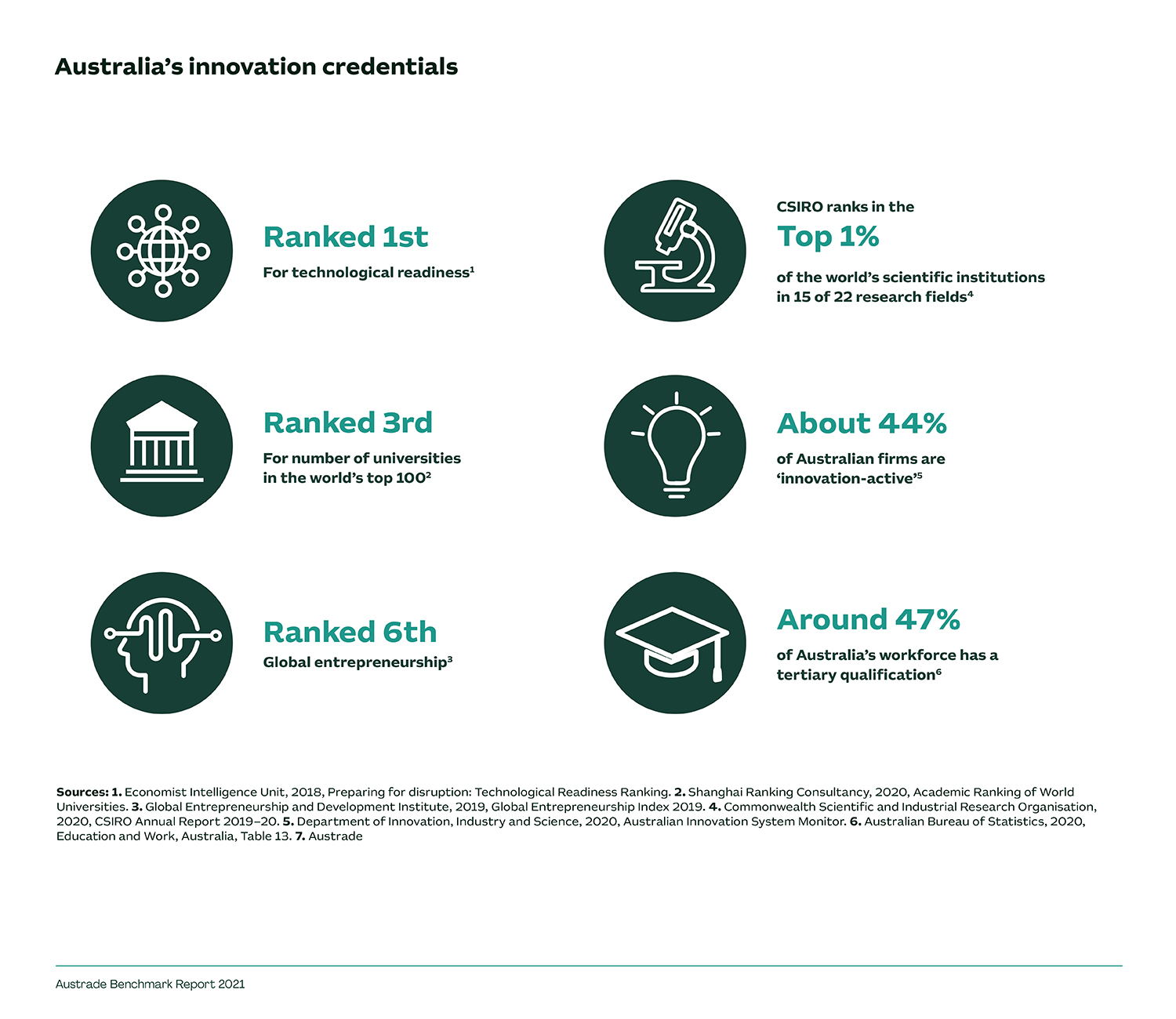
Source: Austrade.gov.au
For this reason, Australian Universities provide cutting-edge research facilities to educate world-class professionals, researchers, and leaders. More than 90% of Australian Universities’ research is rated as world-class or higher, and almost 88% of university research has a medium to higher positive community impact.
The top 5 universities who have ranked the most valuable in Research and Innovation Ranking - Australia 2021 are -
|
Rank |
University |
|
1 |
University of Melbourne |
|
2 |
University of Sydney |
|
3 |
The University of Queensland |
|
4 |
Monash University |
|
5 |
University of New South Wales |
International students interested in research studies have several options to choose their degrees from Postgraduate programs. The first option is pursuing a Master’sResearch (MRes) degree. This is a research-based qualification that allows students to research in their chosen field independently.
This degree is shorter, research-focused and usually works as a pathway to PhD after successful completion. For a full-time student, it takes one year to complete Masters’s by Research. On the other hand, for Masters by Coursework, it takes 2 years.
The second option is pursuing a Doctoral degree where a student can significantly contribute towards a specific field of study. Students can choose either a Research Doctorate (PhD) or a Professional Doctorate based on the depth and significance of their research.
4. Easier Student Visa Access
Applying for Student Visa under Subclass 500 in Australia is comparatively more accessible than in other countries. Once a student is enrolled in a full-time study program, he/she is eligible to apply for Subclass 500 Visa, and the processing time is usually seven days to 6 months. However, the time range may vary from country to country.
The chances of visa rejection are very low unless there is something very wrong with the application process. Reasons like not providing proper financial documents, not having proper health insurance or welfare arrangements, insufficient funds, failure to meet English language requirements, or a significant education gap may cause rejection of visas.
While tuition fees in Australia are comparatively higher than in many other countries, it is essential to show enough funds for fees and living expenses in Australia while applying for a student visa.
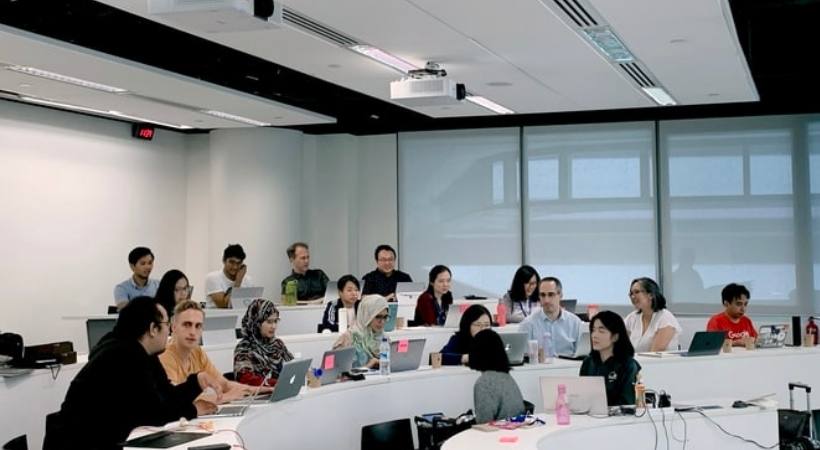
5. Work Opportunities
In Australia finding a job as an international student is much easier. However, it is good to keep in mind that you should not expect to meet your living expenses while working during your studies. However, this may vary from city to city and personal choices.
The government of Australia permits 20 hours of job per week while on a student visa. But international students can work full time during semester/holiday breaks.
Studying in Australia and working side by side is an excellent opportunity because no matter what job you do and how many hours you work, the minimum wage will be the same for everyone, which is around A$18.23. Also, Australia has strong Employee Protection Law, and Government support is always available for student workers.
Ideal work opportunities for students in Australia are in the retail and hospitality industry, such as supermarkets, cafes, bars, departmental stores, and many more for their flexible hours. Services like childcare, old homes, tutoring are also some of the popular work choices among students.
Opportunities to do volunteer work in non-government organizations and charities are also available for students to expand their work experiences. Many universities offer mandatory internships as well.
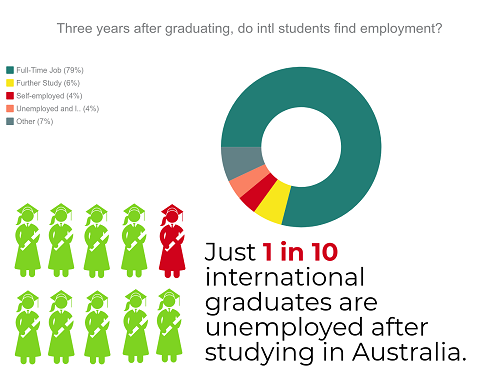
Source: Collegelearners
However, students need to apply for a new working visa or Temporary Graduate Visa (Subclass 485). This visa allows a student to stay in Australia for 18 months, ideally to gain work experience after completing Bachelors’s, Masters or Research degree.
There are other categories of work visas for international students based on requirements and qualifications. In general, Australia uses point systems to evaluate if someone qualifies for a specific category of visa.
A survey suggests that 79% of students land a full-time job after graduating with a bachelor’s degree, and 4% of students classify themselves as self-employed.

6. Easy Communication
The widely spoken language in Australia is English, as they have no official language. For international students, this is one of the safest reasons to study in Australia as all modes of education are in English.
Therefore, there is no need to learn any other languages. However, Australian slang and phrases are pretty popular in the country, and for an international student, this may take some time to understand and get fluent with it.

7. Cultural Diversity
Australia is known as the most culturally diverse nation globally because of a large number of international students and professionals. For many students, studying and living in Australia is solely about cultural diversity because it feels like home.
It is a great learning experience for students as well. They get the chance to meet many people from different cultures, interact with them and learn to develop their mindset in a multicultural setting. This is a chance for students to step outside their comfort zones and live in a community of people all over the globe.
Other than that, the benefits of living and studying in a culturally diverse community are impressive culinary offerings of different cultures, different festivals, and cultural celebrations.
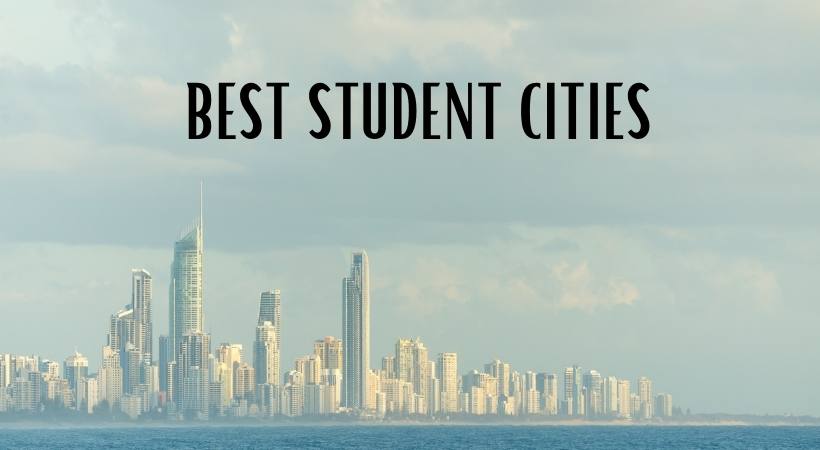
8. Best Student Cities
Australia has some of the best student cities in the world, according to QS Best Student Cities 2016 ranking. Seven Australian cities have been ranked among the top 75 best cities for students based on diversity, employment desirability, highly ranked universities, and Employer Activity.
Melbourne: Ranked the second best student city in the world after Paris. This city is home to 7 universities with international rankings and is the most desirable because of the high standard of living.
Global Rank | Approximate Expenses |
2 | Living Costs - AU$1912 per month Tuition Fees - AU$20,000 to AU$45,000 |
Sydney: Home of some of Australia’s most respectable and affordable universities in Australia.
Global Rank | Approximate Expenses |
4 | Living Costs - AU$2022 per month Tuition Fees - AU$30,000 to AU$50,000 |
Canberra: It is a city of large, diverse international populations and home to Australia’s best university, the Australian National University (ANU).
Global Rank | Approximate Expenses |
17 | Living Costs - AU$1924 per month Tuition Fees - AU$32,000 to AU$45,000 |
Brisbane: Considered as a student-friendly city because the living cost in Australia for international students in this city is comparatively affordable. Also, it is the home of 3 reputable universities.
Global Rank | Approximate Expenses |
18 | Living Costs - AU$1760 per month Tuition Fees - AU$12,000 to AU$25,000 |
Adelaide: It is ranked 26th in the best student city ranking because it is home to many international populations. Located in the south of Australia, three universities based on Adelaide have been ranked among QS World University Ranking of top 550 universities. However, some of the affordable universities of Australia are also situated here.
Global Rank | Approximate Expenses |
26 | Living Costs - AU$1520 per month Tuition Fees - AU$18,000 to AU$22,000 |
Perth: Located on the west coast of Australia, this city is ranked as one of the “most livable cities” in the world. The city is famous among international students because the cost of studying in Australia is comparatively lower in this part of the region and higher number of jobs available. Perth is also known as a Land of Beauty because of its breathtaking natural environment, which is very different from city life.
Global Rank | Approximate Expenses |
36 | Living Costs - AU$1600 per month Tuition Fees - AU$15,000 to AU$37,000 |
Gold Coast: The city is located south of Brisbane and ranked 69th as the best student city. This beach city has scored higher in the “Desirability” index by the international students because of its mild climate. Adelaide is the cheapest city in Australia, which minimizes the cost of studying in Australia. Gold Coast is also the home of 3 major universities of Australia – Griffith University, Bond University, and Southern Cross University.
Global Rank | Approximate Expenses |
69 | Living Costs - AU$1335 per month Tuition Fees - AU$20,000 to AU$37,000 |
Australia is famous for welcoming people and promoting a diverse culture. There are immense opportunities for an international student in Australia, given the quality of education and living standards.
The country has one of the best higher education systems globally, which emphasizes student experiences and graduate outcomes. The globally ranked leading institutions and safe environment to work make Australia a lucrative destination for many international students. So when you look for reasons to study in Australia, there are plenty to convince you!

Cover Letter

Forwarding Letter

Student Financial Planning

Explanation Letter of Source of Fund

Explanation on previous Visa Rejection

